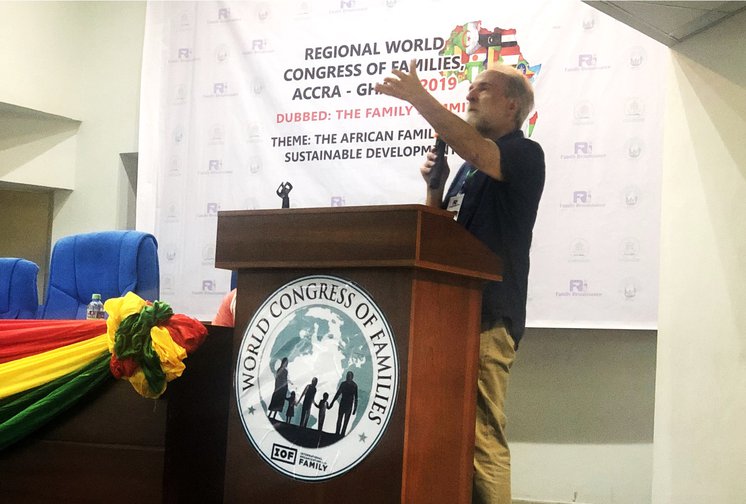
‘God Has A New Africa’: undercover in a US-led anti-LGBT ‘hate movement’
This year, I did something I never thought I would: I went undercover to investigate a group that hates me. This is what I found

This year, I accomplished a feat that I never thought I would: I went undercover to investigate a group that hates me.
Not long after I took my seat in the auditorium in downtown Accra, Ghana, a series of African and American speakers took turns denouncing me and the people I love. A representative of Ghana’s Prisons Service, for example, condemned LGBTIQ people as a “modus to depopulate the world”, and our sexual orientations as “a major part of why we imprison people in Ghana”.
“If we strengthen the family, there will be less people in prisons, but prison will also serve as a corrective measure for sexual deviants,” she argued. Another Ghanaian speaker, Samuel Okudzeto Ablakwa, an MP from the opposition National Democratic Party, used his time on stage to call on his fellow politicians to declare the country “a no-go area for the LGBT agenda”.
Ablakwa took specific aim at new sex education proposals from the Ghanaian government. Incredibly, he compared the proposals to the historical enslavement of “the strongest members of African families” by European colonisers, with the supposed purpose to “penetrate and wreak havoc” on our societies. The crowd around me, dressed in their Sunday best, listened intently.
This was a remarkable manipulation of our history, which is being commemorated this month via Ghana’s Year of Return, marking 400 years since the first slave ship left our shores for Jamestown, Virginia. Members of the African diaspora around the world have travelled to Ghana to join these events. Meanwhile, at the summit I attended, speakers on stage were clear that LGBTIQ people are not welcome here.
‘A summit of hate’
Who organised this summit of hate? The World Congress of Families (WCF), an elite international network led by US and Russian ultra-conservatives and best known for publicly and militantly opposing LGBT rights and abortion – though its members are also against contraception, comprehensive sexuality education (CSE), divorce, single mothers and multi-generational households.
Recent openDemocracy research further revealed this network’s numerous links to Islamophobic, far-Right and white supremacist movements. Its European allies have called African migrants “slaves” and “poison”. Despite this, most of the speakers at the WCF’s regional conference, held in Accra at the end of October, were from Ghana, Nigeria and other African countries.
The summit’s local host was a group called the National Coalition for Proper Human Sexual Rights and Family Values. Recently, it has led a fierce and well publicised backlash against the government’s new sex education proposals that aim to “provide young people with the knowledge and skill to make informed choices” about their sexual and reproductive health.
In the weeks preceding the conference we heard and read the National Coalition and its allies incessantly denounce the Ministry of Education’s new (and since stalled) sex education guidelines, warning Ghanaians of the pending doom that would await us if they are approved. Opponents claimed that “outside forces” are seeking to infiltrate our schools to poison youth with the “LGBT agenda”.
‘Would I be discovered? Would I be triggered? Would I be asked to commit my life to Jesus Christ before I even entered the event?’
The rights of LGBTIQ people are already heavily restricted in Ghana. Hate crimes are common, but rarely monitored and challenged even less frequently. The WCF speakers were right that there’s a link with colonialism – but not the one they claimed. Rather, our laws criminalising homosexuality come straight from the British Empire (though they were retained after independence).
The recent assault against CSE is thus just the latest in a never-ending witch hunt against sexual minorities in the country. This was the context in which I gathered my courage and entered the Ghana Shippers Authority building – the downtown Accra venue for the WCF conference – which was surrounded by armed police.
Preparing for the summit, I was unsure of what to expect. I was also deeply conflicted. I am a queer feminist activist. Would I be discovered? Would I be triggered? Would I be asked to commit my life to Jesus Christ before I even entered the event? My main concern was staying at the conference long enough to learn about this network’s strategies and plans for the next year.
At the venue, organisers were clearly keeping a watchful eye over who entered and exited. I’d heard that activists and some journalists had been forcefully removed from previous WCF events in Europe, for attempting to infiltrate this movement. I was aware that my presence had to be carefully managed, but moved forward with a deep sense of conviction and a bold curiosity.
Before entering the building, I passed tables of flyers, books and DVDs with titles such as ‘Dangerous Relations: The Threat of Homosexuality’ and ‘The Power of a Praying Husband’, as well as ‘The Seven Principles of Success and Wealth Creation: Experiences of an Accomplished Entrepreneur’. Inside, young and bright-eyed usherettes guided me to the main hall.
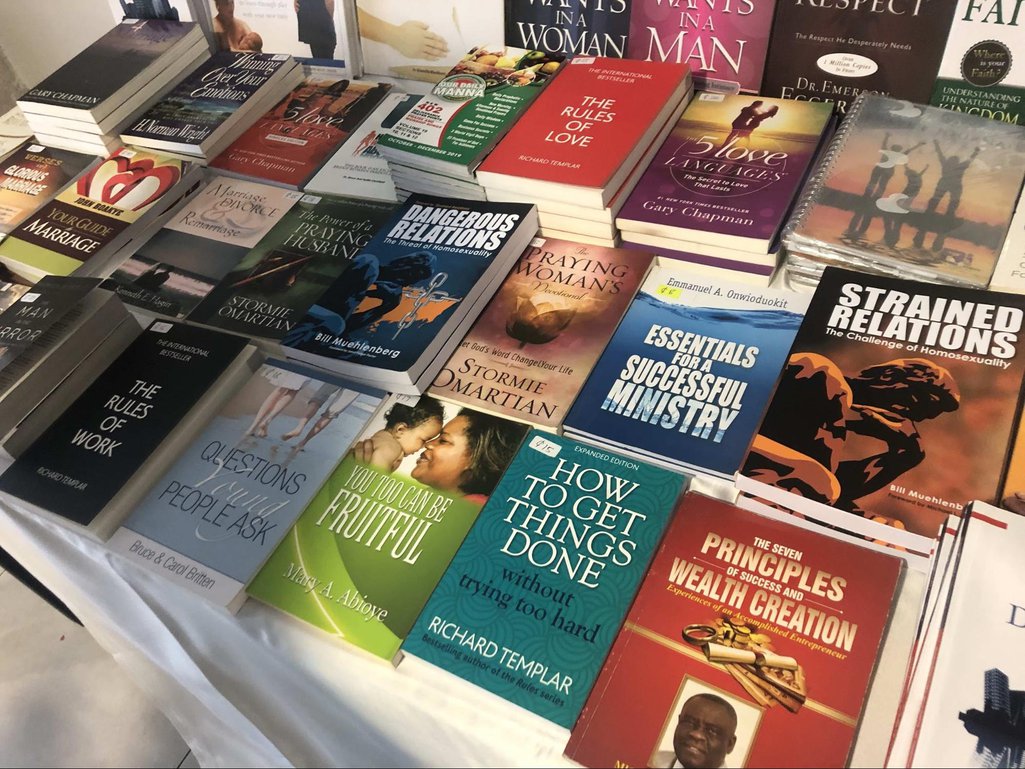
Although the two-day conference had been advertised as an event to bring people together in fellowship and deep reverence for families, I felt an immense air of suspicion and mistrust. Speaker after speaker focused or framed their comments with grave warnings of how already repressed sexual minorities would supposedly destroy the nation.
As I took my seat, a little girl flashed across a screen before us, scared and confused because she had been removed from her classroom for not wanting to learn about “sinful things”. She was followed by a white American evangelist who said LGBT-inclusive education is a “war on our children” with “these new terms that make a mockery out of God’s natural law of the family”.
As the video played, the hall filled up with just over 100 men and women reacting with pity for the scared little girl, and concern over the diabolical state of our world. An older Kenyan man to my right scoffed each time the word “transgender” was mentioned. I resisted the urge to show my indignation at half-truths and pseudo-scientific arguments presented by “experts” in the film.
The sense of urgency in the room was palpable. I felt surrounded by people ready for war. This, I thought, was about to be the longest two days of my life.
‘I felt surrounded by people ready for war. This, I thought, was about to be the longest two days of my life’
The conference hall was a two-storey auditorium, with several African flags plastered across the top bannister. I was told by one conference organiser that, along with Ghanaians, there were participants from more than a dozen other countries, mostly from Africa. Soon we were introduced to one of the key players of this movement, Reverend Catherine Onwioduokit.
Onwioduokit is president and founder of a Nigerian group called Family Renaissance International (FRI), which is well known for its role in advocacy for the Same-Sex Marriage Prohibition Act, passed in 2014. “It has been a long way coming,” she said of the WCF summit in Accra. We were then asked to stand in prayer, and subsequently for the national anthem of Ghana.
Africa’s first nation to gain independence from colonial rule, Ghana was positioned at this summit as a new leader in the war against LGBTIQ inclusion on the continent. The WCF’s Africa regional representative Theresa Okafor even introduced a new acronym: G.H.A.N.A., standing for ‘God Has A New Africa’.
Moses Foh-Amoaning, leader of the local National Coalition, boasted of support from what he called the “Holy Trinity” of Christian, Muslim and traditional leaders in Ghana to fight comprehensive sexuality education. He also pledged to support similar campaigns from Togo to Uganda.
True to his word, Foh-Amoaning had invited both Muslim and traditional leaders to speak at the summit, including Professor Zakaria and Professor Nii Odartei Mills. The former took aim at the International Planned Parenthood Federation, the global reproductive health NGO, while the latter told us that Ghana “has very strong cultural structures to contain homosexuality”.
Africa’s first nation to gain independence was positioned as a new leader in the war against LGBTIQ inclusion. ‘G.H.A.N.A. – God Has A New Africa’
Despite its US and Russian roots, this WCF summit felt distinctly African. Indeed, the American presence was tiny, with notable exceptions – including Brian Brown, president of the US-based International Organisation for the Family (and global president of WCF). He spoke of a “mission to unite organisations, families and individuals around the shared vision of the natural family”.
Brown claimed that many sovereign states in the Global South had been “bullied” into accepting sexual and reproductive rights and health goals. American evangelist Bill Muehlenberg apologised on behalf of the West for failing to win their own cultural war and applauded African activists for “putting Christianity to shame in the West”.
Another American speaker, Sharon Slater, specifically encouraged Ghanaian participants to lobby national politicians to reject CSE, and to further legislate for “parental rights” to decide what children learn in school. Her husband and fellow activist Greg Slater argued that sexual and reproductive rights under international law are “fictitious”.
The summit's agenda had been expanded from three to seven sessions on topics including ‘Marriage, Family and Parenting for Sustainable Development’. A final plenary would present proposals for action over the next year. Alongside these sessions, we were encouraged to network for further “movement-building” and conservative collaboration across borders.
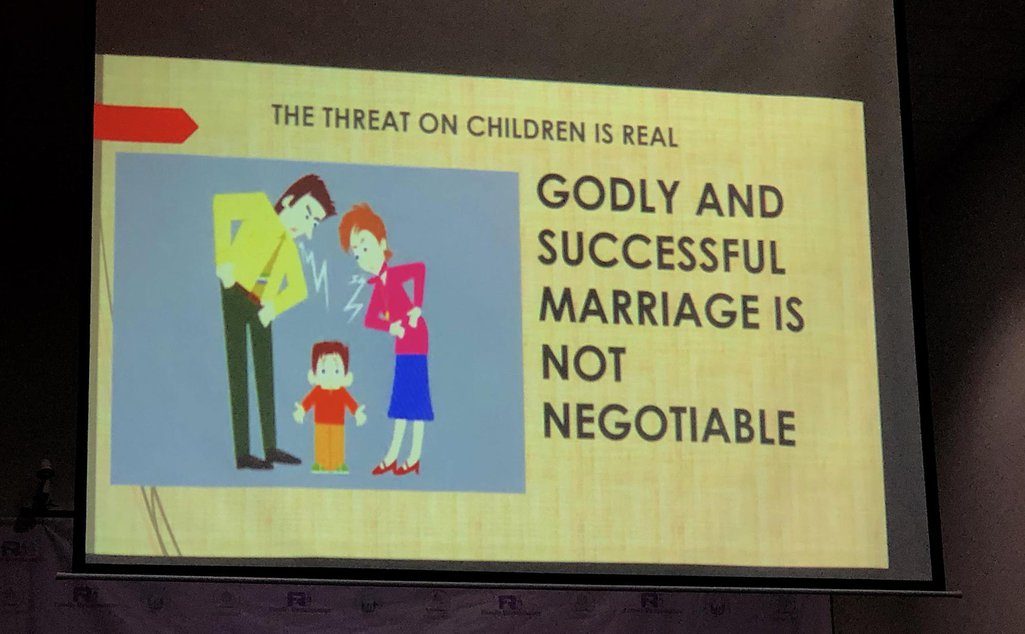
The event's core message was that “strong families create strong nations”, and that Africa’s traditional values are under threat from outside forces. Speakers even blamed corruption and political mismanagement in Africa on family structures that deviate from ‘the natural order’ of God – that is, two-parent households containing a married man and woman and their many children.
For their part, the women of the WCF summit adopted a decidedly anti-feminist stance, to support families led by men as the only possibility. Abena Asomaning Antwi, a supposed “gender advocate”, made bold yet convoluted arguments that overcrowded prisons lead to homosexual activity with inmates “practically sleeping on top of each other”.
Another speaker, Akech Aimba, spoke about the shame, regret and hatred towards God she said that women face after having abortions. A Nigerian activist, Theresa Okafor, warned us not to be manipulated by the UN's language promoting “women’s empowerment”, which she claimed risks turning women into heads of their families, at the expense of men.
In the conference’s final session, we heard again from Reverend Onwioduokit, who presented a laundry list of bold and expansive actions to focus on over the next year – including establishing new organising structures for the movement across the continent, with competent and efficient legal teams to focus on court cases and constitutional challenges.
Other actions included testing “holistic sexual therapy systems to bring healing and comfort to Africans and other persons with LGBTQI disorders”. We must use all of our “spiritual weapons” to block the “LGBTQI propagandist onslaught” across the continent, she said, including via lobbying at the African Union. Each item was met with a chorus of “yeses” from her audience.
One comment from the floor drove home the convention’s core message. A woman stood up to criticise the summit’s flyer, which depicted a woman, man and three children. Future promotional materials should show at least five children, she argued, to avoid giving the “wrong impression” that this movement “supports family planning”. Her comment was met with a mix of laughter and applause, and her suggestion was recorded and accepted.
Over the course of the summit, I felt outrage, bewilderment and utter disbelief at its absurdity. While claiming to be invested in families, the WCF rejects any family that includes LGBTIQ parents and children. As we prepare for the holiday season, many queer and trans* youth across Africa are bracing themselves to meet relatives who continue to reject them.
Such rejections are often because of, or emboldened by, the rhetoric of conservative movements like the WCF. What we really need is for our young people to find healing, safety and new definitions of family that don’t require the erasure of their humanity and basic rights.
Read more
Get our weekly email
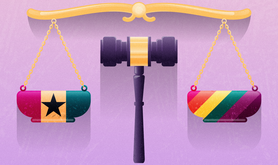
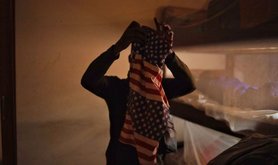
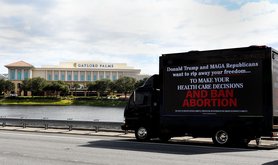
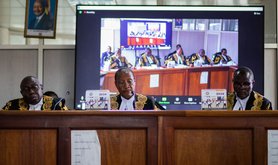
Comments
We encourage anyone to comment, please consult the oD commenting guidelines if you have any questions.